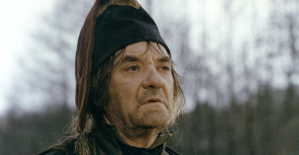With the large number of new releases and sequels on Netflix, Amazon and Co., it is easy to lose track. What's worth it? What can you leave behind? Here are our picks of the week, the most interesting scene and a confession.
"Extrapolations" (Apple TV, first season)
There are good reasons to assume that what the eight-part "Extrapolations" shows us as a future scenario for the years 2037 to 2070 will occur in a very similar way. Because the director and producer Scott Z. Burns already wrote the screenplay for Steven Soderbergh's "Contagion" - a pandemic drama that anticipated Corona in 2011 with incredible accuracy. So it pays to watch closely as superstars like Meryl Streep and Sienna Miller grapple with a heated earth ravaged by wildfires, flooding, biodiversity loss and emerging diseases. Although, you don't have to look that closely, because hardly a scene fails to spell out the eco-political conflict in all clarity.
“Do you need anything else?” a young woman is asked right at the beginning. "That people listen," is her meaningful answer. Sighs like "Take a look around!", "It's up to us to change something!" and "Why does God allow that?" meet a penetrating orange filter that doesn't let you forget how warm it is in the living room of the Rabbi (Daveed Diggs) quoting Sodom and Gomorrah. And if you forget it for a moment, you will be responsibly reminded of it by a newsreader who keeps stepping in and showing bird's-eye views of a brightly lit world.
Most animal species are no longer there (no tigers and only one whale), but other traditions that have long been declared dead have survived: reading aloud, childbirth and church services enter into a natural symbiosis with 3D avatars, artificial intelligence and digital processes Translation of animal sounds into human language. Unlike M. Night Shyamalan's recently released horror film "Knock at the Cabin", "Extrapolations" (the title contains the generational continuation, the cinematic approximation and the mathematical extrapolation) comes up with a similarly loud catastrophe overkill, but it does present the crisis in the long run: The cruel thing is not, as some activists would like us to believe, that tomorrow everything will perish if we don't change anything today. But that it will continue even then. Marie Luise Goldman
"Silicon Valley" (Wow, six seasons)
The shortest history of the internet? Told in the opening credits of HBO's Silicon Valley (one of the shortest opening credits of all time, by the way). As in a city-building game, you can watch the valley doing its favorite pastime, creative destruction, also known as disruption. The company headquarters are spread out over the model city like tokens, new ones are added in each season, others have suddenly disappeared, and it's actually a miracle that the Amazon drone and the Uber balloon didn't even come across the Silicon Valley Bank token float away, whose headquarters actually look like they were designed for a mobile city game.
Anyone who has seen "Silicon Valley", the series, is not surprised that Bank Silicon Valley went bankrupt. If you don't know the series yet, you now have twice the reason to finally see it. Because the creators simply turned the famous Marx saying around: before the real tragedy came the serial farce.
In a way, we have already seen the queue of the unfortunate standing in front of the Silicon Valley bank in "Silicon Valley": the hyper-nervous exceptional coder Richard Hendricks (Thomas Middleditch), who is reliably hit on the stomach by the eternal disruption; the programmer Dinesh, who pours his temporary fortune into a grossly overpriced Tesla; the satanist Gilfoyle, who mines bitcoins with creepy sound effects; Jared sleeping in the garage due to lack of housing; or the loud-mouthed Erlich Bachman, who is King Currywurst at the venture capitalists and who, in complete farce, is missing only an h in his first name.
Maybe the Silicon Valley bank has bet too much on the likes of him a few times. In any case, it's no wonder that Bachmann soon disappeared in the series while on a yoga retreat. By the way, "Pied Piper" is the name of the start-up that runs the "Silicon Valley" troupe for six seasons. In German it simply means "pied piper". Wieland friend
"Ted Lasso" (Apple TV, third season)
Criticizing "Ted Lasso" is like beating up a teddy bear. The story about the brute, sympathetic understanding person who, having failed as a football coach in the USA, takes over the management of an English Premier League team, is one of the biggest hits from Apple's rather mediocre streaming service. A series that is somehow about football, but above all about a lot of feeling. Visually a live-action version of the Simpsons' evangelical nerve neighbor Ned Flanders, Lasso solves all problems with good humor and optimism. Couples are brought together, women are empowered, egomaniac kickers become team players, everything always turns out well - without it having been particularly bad before. Now the third season starts (one episode available) and shows that it will always, always, always go on like this. Let's call it the "Gilmour Girls" syndrome: by the fourth Fall Festival at the latest, the sixth reconciliation, every feel-good series practically becomes a re-start of itself. You can see. But you can also leave it. Peter Huth
"The Mandalorian" (Disney , Third Season)
Everything is completely Mando for ten minutes, then “Andor” takes over. Seldom before has there been such a violent break in a series as in "The Convert", the third installment of Jon Favreau's "The Mandalorian". After a spectacular dogfight (which is intended to satisfy all action fans in order to make what is to come consumable for them), the setting and personnel, the tonality and the depth of the dialogue are radically changed. In the merry-go-round of post-dictatorial Coruscant (capital of the Star Wars universe), Dr. Pershing (that's the one who abused the little Grogu in season 1 for his experiments) amnesty for his misdeeds in the service of the defeated empire and is to be reintegrated into society. But the candy-happy democracy of the "New Republic" in its efforts to make everything better is strikingly similar to the young empire whose rise the hyper-series "Andor" describes. In the end Pershing ends up in a kind of woken development of the "thought flayer" - the most terrible torture weapon of the former dictatorship. This is the scene of the week. Peter Huth
"Death in Paradise" (ZDF media library and Disney, 12 seasons)
I will probably never come to the Caribbean in person again in my life. Which isn't so bad. I can't surf, I don't drink rum, I don't like beach holidays. For extreme perspiration athletes like me, Guadeloupe would probably be unhealthy anyway. And there is - in the ZDF media library and at Disney - "Death in Paradise". That's how I drove Corona away the other day, locked up with hundreds of crime novels and a television. Potentially infinite – the 100th episode has just been filmed, seasons 13 and 14 have just been announced by the BBC and France Télévisions – which is very comforting with Corona. More murders happen than the South Seas Tourism Association can handle. In the meantime, large parts of Sainte Marie, as Gouadeloupe is called in "Death in Paradise", should be orphaned. Arch-British, wacky commissioners (Ralf Little as Detective Inspector Neville Parker is already the fourth chief investigator) are allowed to work where others go on holiday, which they don't want because they were more or less transferred for punishment.
Half-aged, white men who are like I would be, constantly showing their uniformed black colleagues where Sherlock's hat is hanging while they show them how life works and what it means to be human. Anyone who is now sending the post-colonialism police down my neck is of course right and wrong. Death in Paradise knows it all, subverts it all. Does not matter. "Death in Paradise" was the last sanctuary of the whodunnit long before the old crime counting machine is now at "Knives out"

 B:SM will break its investment record this year with 62 million euros
B:SM will break its investment record this year with 62 million euros War in Ukraine: when kyiv attacks Russia with inflatable balloons loaded with explosives
War in Ukraine: when kyiv attacks Russia with inflatable balloons loaded with explosives United States: divided on the question of presidential immunity, the Supreme Court offers respite to Trump
United States: divided on the question of presidential immunity, the Supreme Court offers respite to Trump Maurizio Molinari: “the Scurati affair, a European injury”
Maurizio Molinari: “the Scurati affair, a European injury” Beware of the three main sources of poisoning in children
Beware of the three main sources of poisoning in children First three cases of “native” cholera confirmed in Mayotte
First three cases of “native” cholera confirmed in Mayotte Meningitis: compulsory vaccination for babies will be extended in 2025
Meningitis: compulsory vaccination for babies will be extended in 2025 Spain is the country in the European Union with the most overqualified workers for their jobs
Spain is the country in the European Union with the most overqualified workers for their jobs In the United States, a Boeing 767 loses its emergency slide shortly after takeoff
In the United States, a Boeing 767 loses its emergency slide shortly after takeoff The A13 motorway will not reopen on May 1
The A13 motorway will not reopen on May 1 More than 1,500 items for less than 1 euro: the Dutch discounter Action opens a third store in Paris
More than 1,500 items for less than 1 euro: the Dutch discounter Action opens a third store in Paris 100 million euros in loans, water storage, Ecophyto plan… New measures from the executive towards farmers
100 million euros in loans, water storage, Ecophyto plan… New measures from the executive towards farmers New York justice returns 30 works of art looted from Cambodia and Indonesia
New York justice returns 30 works of art looted from Cambodia and Indonesia Les Galons de la BD dedicates War Photographers, a virtuoso album on the Spanish War
Les Galons de la BD dedicates War Photographers, a virtuoso album on the Spanish War Theater: Kevin, or the example of an academic failure
Theater: Kevin, or the example of an academic failure The eye of the INA: Jean Carmet, the thirst for life of a great actor
The eye of the INA: Jean Carmet, the thirst for life of a great actor Skoda Kodiaq 2024: a 'beast' plug-in hybrid SUV
Skoda Kodiaq 2024: a 'beast' plug-in hybrid SUV Tesla launches a new Model Y with 600 km of autonomy at a "more accessible price"
Tesla launches a new Model Y with 600 km of autonomy at a "more accessible price" The 10 best-selling cars in March 2024 in Spain: sales fall due to Easter
The 10 best-selling cars in March 2024 in Spain: sales fall due to Easter A private jet company buys more than 100 flying cars
A private jet company buys more than 100 flying cars This is how housing prices have changed in Spain in the last decade
This is how housing prices have changed in Spain in the last decade The home mortgage firm drops 10% in January and interest soars to 3.46%
The home mortgage firm drops 10% in January and interest soars to 3.46% The jewel of the Rocío de Nagüeles urbanization: a dream villa in Marbella
The jewel of the Rocío de Nagüeles urbanization: a dream villa in Marbella Rental prices grow by 7.3% in February: where does it go up and where does it go down?
Rental prices grow by 7.3% in February: where does it go up and where does it go down? Even on a mission for NATO, the Charles-de-Gaulle remains under French control, Lecornu responds to Mélenchon
Even on a mission for NATO, the Charles-de-Gaulle remains under French control, Lecornu responds to Mélenchon “Deadly Europe”, “economic decline”, immigration… What to remember from Emmanuel Macron’s speech at the Sorbonne
“Deadly Europe”, “economic decline”, immigration… What to remember from Emmanuel Macron’s speech at the Sorbonne Sale of Biogaran: The Republicans write to Emmanuel Macron
Sale of Biogaran: The Republicans write to Emmanuel Macron Europeans: “All those who claim that we don’t need Europe are liars”, criticizes Bayrou
Europeans: “All those who claim that we don’t need Europe are liars”, criticizes Bayrou These French cities that will boycott the World Cup in Qatar
These French cities that will boycott the World Cup in Qatar Tennis: “I need to regain confidence in my body,” explains Rafael Nadal
Tennis: “I need to regain confidence in my body,” explains Rafael Nadal NBA: Orlando returns to level with Cleveland in the 1st round of the play-offs
NBA: Orlando returns to level with Cleveland in the 1st round of the play-offs Tennis: Iga Swiatek in the round of 16 at full speed
Tennis: Iga Swiatek in the round of 16 at full speed “It was exceptional here in Chaban-Delmas”: Escudero looks back on the excitement around France-England
“It was exceptional here in Chaban-Delmas”: Escudero looks back on the excitement around France-England

















